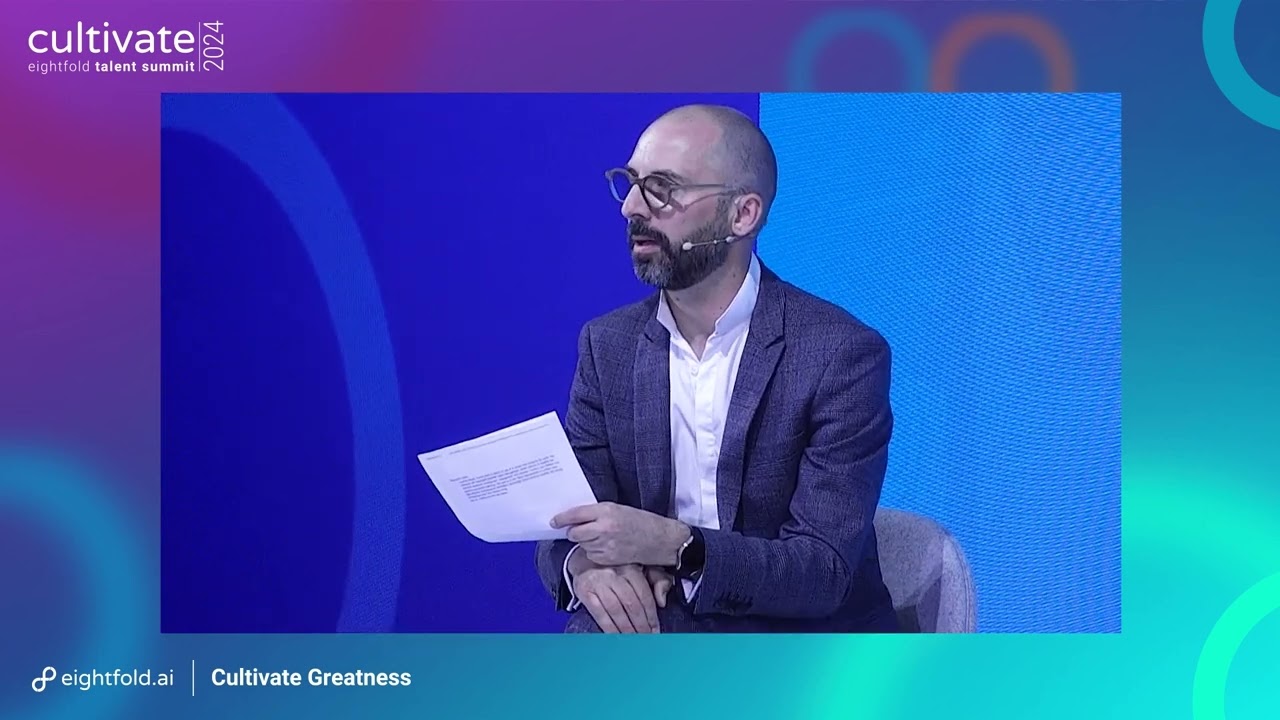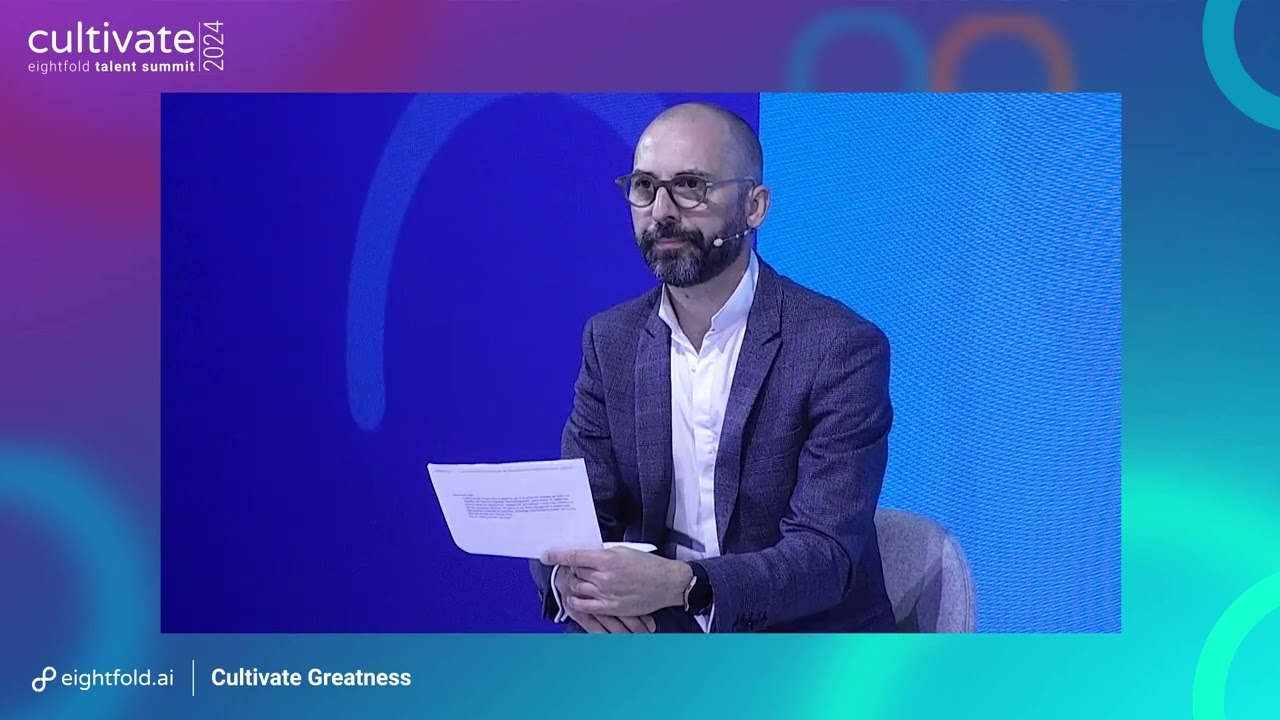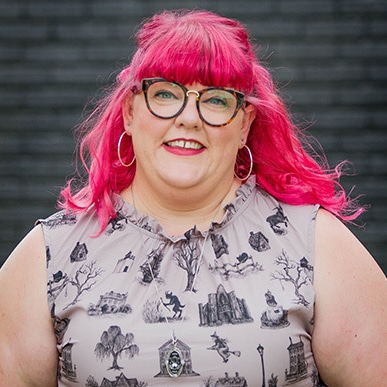As a major tech company, sometimes the challenge is finding partners that can meet you where you are.
That was the case for Forvia as the French-based automotive parts supplier started its journey using talent intelligence to hire on a global scale. “It’s really part of our DNA,” Gaël Barjot, HR Lab Director at Forvia, said about how the company approaches technology.
After Forvia’s CEO challenged Barjot’s HR team to try AI, they landed on Eightfold in 2021. To date, they’ve successfully rolled out their talent acquisition component globally and are now launching talent management.
Barjot joined Phil Jones, General Manager, EMEA & APAC at Eightfold, at Cultivate Europe ’24 to share more on Forvia’s story, including why the company chose Eightfold, success stories, and the award they’ve recently won for digital HR.
[Ed note: Quotes have been edited for clarity and length.]

Related content: Watch this conversation with Gaël Barjot of Forvia and Phil Jones of Eightfold from Cultivate Europe ‘24.
Phil Jones: The automotive sector, as a whole, is going through a lot of transformation at the moment. Can you share some of the challenges that you and the team have faced, particularly around in-demand talent and recruiter workflows?
Gaël Barjot: The industry is moving very fast and changing very deeply. In Europe, we see new regulations that will move us to a more sustainable business. We see, as well, the global footprint moving OEMs [original equipment manufacturers] in Europe. We drive lots of transformation in terms of workforce, new digital skills, and new tech skills. We are fighting for the same people and looking for a more balanced workforce — more gender diversity, as well, because we know that we need people from diverse backgrounds to bring creativity. This is the complexity of our business.
PJ: Many are thinking about how they will embark on a journey into talent intelligence. What were your reasons behind why you decided to enter that AI space?
GB: Our first decision was starting with Eightfold in 2021. Our CEO invited us to explore the possibility of AI — what AI could bring to the HR population. We are a tech company. We have a lot of AI and technology in our processes and systems.
And then we explored the business. We discovered that thanks to AI, we could do predictive matching. We found ways to improve the way we attract [applicants] and how we will recruit, how we source, the way we manage, internal mobility, and so on.
The problem we had was we were looking for a partner that could work in our technical environment. We were looking for a seamless integration and a partner with the strongest endorsement with SAP SuccessFactors. We were also looking for a system that would cover the full scope for attraction, recruitment, and talent management.
PJ: When people think about AI, it’s sometimes perceived as very complex, very difficult to get around the internal landscape and ready yourself for the change. Forvia’s journey is incredible. You’ve driven 100% adoption across 35 countries in only a matter of months. Any insights you can share that helped you to be able to implement Eightfold?
GB: We decided to deploy talent acquisition first because it was an external process. We decided to build a team with people coming from different countries because even if we have consistent HR processes, even if we have consistent technological infrastructure, we want it to consider all the specificities. We wanted to address all this diversity during the design configuration or deployment.
Thanks to this approach — working all together, sharing the same ambition — we’ve been able to succeed fast. We deployed in roughly four or five months between the design and the implementation, and we decided to launch everywhere at the same time.
To be honest, it was not easy. For instance, we discovered that even if we have one single ATS, sometimes local partners discovered that the data was not so good, but something that was key in the adoption of the project working together.
PJ: Tell us a little bit about your tech stack. What technology platform do you use, and where does Eightfold fit in?
GB: We were in SAP SuccessFactors as our system of record, and when we launched, honestly, it wasn’t perfect but it’s part of the game. We are also a Microsoft client, so we wanted that integration with our Microsoft tools. We are Copilot clients and LinkedIn clients as well, so for us, integration with CRM was critical.

PJ: Can you share some insights around the candidate experience and some of the early wins or early learnings that you found?
GB: What we discover is that we have been able to reboot our career sites. Our career site was supposedly dying, and thanks to everything that we did with the CRM, we’ve been able to multiply by four the traffic on our current sites and double the ratio of visitors to beacons. We’ve also been able to increase the volume of people for positions.
Now we have a talent network of foreign people, so in Europe, for instance, where there is a talent shortage, we are able to use the talent discovery activity feature to find [applicants] and to engage discussion with them.
We have been able to win some awards. We’ve been able to make some productivity gains, thanks to the automation. It’s not widely deployed, but in some specific countries where we implemented the scheduling, communication, or automations workflow, we’ve demonstrated a 40% increase in productivity.
Our mission is to allow our people to spend more time with the candidates, set the vision, build intimacy, and try to find the purpose. Working in the auto industry, that can sometimes be tough. We want to make sure that we have people with a good cultural fit.
PJ: Those results aren’t just limited to the candidate experience. You’ve seen some increase on the recruiter side. Anything you can share on the recruiter experience as well?
GB: Recruiters still have some resistance. Being able to work with them as a group and have them from day one in the design made a difference. We’ve been able to demonstrate the benefits, the value, and the productivity. Now they are OK with learning new things. We are developing new skills and have retrained all of our recruiters.
PJ: You mentioned the award — this is an award for digital HR, and it’s around innovation in recruitment. It’s the fourth award that you and the Forvia team have won. What can you share about the background for that award?
GB: We advocate that we are a tech company, and this project really demonstrates that we are a tech insider as well. It’s not a technological project. If you consider this as tech, you’ll fail. It’s really about people. Spend more time thinking about your people because it will make a difference.
PJ: This is the beginning of your journey. You’ve started with TA. Anything that you can impart on what’s next for Forvia and talent intelligence?
GB: We are about to deploy talent management. Everything is ready. We’ve done the pilot to proof of concept with one of the most complex jobs to source which is plant manager. It has been a success. And there is a technical technical roadmap where we’ll deploy Copilot and the CRM features.
Watch this entire conversation with Forvia from EU Cultivate ’24, now on demand.
